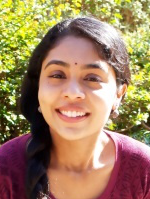Accepted papers
The accepted papers are listed below and available at OpenReview. This does not constitute a proceeding for the workshop.
Optimal recovery of missing values for non-negative matrix factorization: A probabilistic error bound
Rebecca Chen, Lav R. Varshney
Visna---Visualising Multivariate Missing Values
Antony Unwin, Alexander Pilhoefer
Causal Discovery in the Presence of Missing Values for Neuropathic Pain Diagnosis
Ruibo Tu, Kun Zhang, Bo Christer Bertilson, Clark Glymour, Hedvig Kjellström, Cheng Zhang
Multi-output prediction of global vegetation distribution with incomplete data
Rita Beigaite, Jesse Read, Indre Zliobaite
A Penalized Likelihood Approach for Statistical Inference in a High-Dimensional Linear Model with Missing Data
Jiwei Zhao
A Random Matrix Analysis of Learning with α-Dropout
Mohamed El Amine Seddik, Romain Couillet, Mohamed Tamaazousti
Path Imputation Strategies for Signature Models
Michael Moor, Max Horn, Christian Bock, Karsten Borgwardt, Bastian Rieck
Clustering Data with nonignorable Missingness using Semi-Parametric Mixture Models
Marie Du Roy de Chaumaray, Matthieu Marbac
Estimating conditional density of missing values using deep Gaussian mixture model
Marcin Przewięźlikowski, Marek Śmieja, Łukasz Struski
Does imputation matter? Benchmark for real-life classification problems.
Katarzyna Woźnica, Przemyslaw Biecek
VAEs in the Presence of Missing Data
Mark Collier, Alfredo Nazabal, Chris Williams
Missing the Point: Non-Convergence in Iterative Imputation Algorithms
Hanne I. Oberman, Stef van Buuren, Gerko Vink
Predicting Feature Imputability in the Absence of Ground Truth
Niamh McCombe, Xuemei Ding, Girijesh Prasad, David P Finn, Stephen Todd, Paula L McClean, Kongfatt Wong-Lin
Variance estimation after Kernel Ridge Regression Imputation
Hengfang Wang, Jae Kwang Kim
Online Mixed Missing Value Imputation Using Gaussian Copula
Eric Landgrebe, yuxuan zhao, Madeleine Udell
Imputation of Missing Behavioral Measures in Connectome-based Predictive Modelling
Qinghao Liang, Dustin Scheinost
Handling Missing Data in Decision Trees: A Probabilistic Approach
Pasha Khosravi, antonio vergari, YooJung Choi, Yitao Liang, Guy Van den Broeck
The Dynamic Latent Block Model for Sparse and Evolving Count Matrices
Giulia Marchello, Marco Corneli, Charles Bouveyron
Missing rating imputation based on product reviews via deep latent variable models
Dingge Liang, Marco Corneli, Pierre Latouche, Charles Bouveyron
Lung Segmentation from Chest X-rays using Variational Data Imputation
Raghavendra Selvan, Erik Dam, Nicki Skafte Detlefsen, Sofus Rischel, Kaining Sheng, Mads Nielsen, Akshay Pai
Inferring Causal Dependencies between Chaotic Dynamical Systems from Sporadic Time Series
Edward De Brouwer, Adam Arany, Jaak Simm, Yves Moreau
The impact of incomplete data on quantile regression for longitudinal data
Anneleen Verhasselt, Alvaro José Flórez, Ingrid Van Keilegom, Geert Molenberghs
Multi-label Learning with Missing Values using Combined Facial Action Unit Datasets
Jaspar Pahl, Ines Rieger, Dominik Seuss
A Study on Intentional-Value-Substitution Training for Regression with Incomplete Information
Takuya Fukushima, Tomoharu Nakashima, Taku Hasegawa, Vicenç Torra
How to miss data? Reinforcement learning for environments with high observation cost
Mehmet Koseoglu, Ayca Ozcelikkale
Processing of incomplete images by (graph) convolutional neural networks
Tomasz Danel, Marek Śmieja, Łukasz Struski, Przemysław Spurek, Lukasz Maziarka
Conditioning on "and nothing else": Simple Models of Missing Data between Naive Bayes and Logistic Regression
David Poole, Ali Mohammad Mehr, Wan Shing Martin Wang
Multi-Time Attention Networks for Irregularly Sampled Time Series
Satya Narayan Shukla, Benjamin Marlin
How to deal with missing data in supervised deep learning?
Niels Bruun Ipsen, Pierre-Alexandre Mattei, Jes Frellsen
VAEM: a Deep Generative Model for Heterogeneous Mixed Type Data
Chao Ma, Sebastian Tschiatschek, Richard E. Turner, José Miguel Hernández-Lobato, Cheng Zhang
Working with Deep Generative Models and Tabular Data Imputation
Ramiro Camino, Christian Hammerschmidt, Radu State
Information Theoretic Approaches for Testing Missingness in Predictive Models
Shreyas A Bhave, Rajesh Ranganath, Adler Perotte








